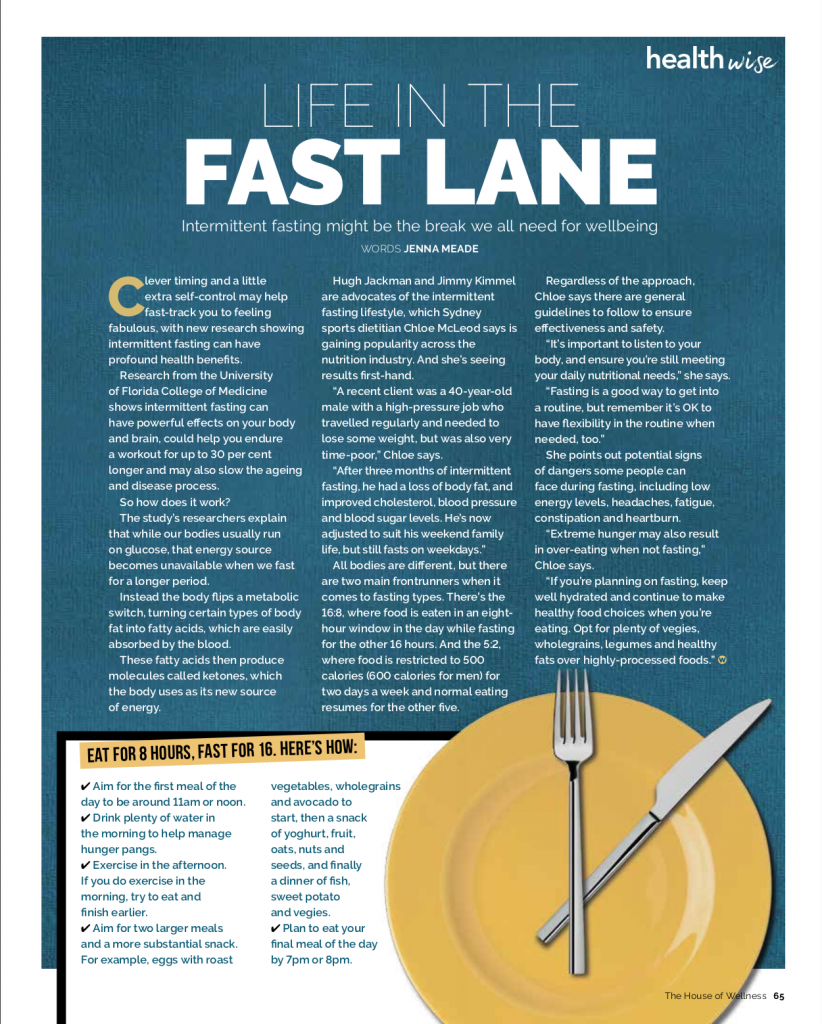New studies show intermittent fasting can have profound health benefits.
University of Florida College of Medicine research shows intermittent fasting can have powerful effects on your body and brain, may help you endure a workout for up to 30 per cent longer and may also slow the ageing and disease process.
Scientists say while our bodies usually run on glucose, that energy source becomes unavailable when we fast for a longer period.
Instead, the body flips a metabolic switch, turning certain types of body fat into fatty acids that are easily absorbed by the blood.
These fatty acids then produce molecules called ketones, which the body uses as its new source of energy.
Related: What happened when I tried intermittent fasting
A dietitian’s view
Sydney sports dietitian Chloe McLeod says intermitting fasting is gaining popularity across the nutrition industry, and she’s seeing results first-hand.
“A recent client was a 40-year-old male with a high-pressure job who travelled regularly and needed to lose some weight, but was also very time poor,” Chloe says.
“After three months of intermittent fasting, he had a loss of body fat, and improved cholesterol, blood pressure and blood sugar levels. He’s now adjusted to suit his weekend family life, but still fasts on weekdays.”
Different types of fasting
All bodies are different, but there are two main frontrunners when it comes to fasting types.
There’s the 16:8, where food is eaten in an eight-hour window across the day while fasting for the other 16 hours.
And the 5:2, where food is restricted to 500-600 calories for two days in the week and normal eating resumes for the other five.
Regardless of the approach, Chloe says there are general guidelines to follow to ensure effectiveness and safety.
“It’s important to listen to your body and ensure you’re still meeting your daily nutritional needs,” she says.
“Fasting is a good way to get into a routine, but remember it’s OK to have flexibility in the routine when needed, too.”
What to watch out for
Some people experience low energy levels, headaches, fatigue, constipation and heartburn when doing intermittent fasting, says Chloe.
“Extreme hunger may also result in over-eating when not fasting,” she says.
“If you’re planning on fasting, keep well hydrated and continue to make healthy food choices when you’re eating.
“Opt for plenty of veggies, wholegrains, legumes and healthy fats over highly-processed foods.”
16:8 fasting for beginners
This fasting method allows you to eat in an eight-hour window across the day while fasting for the other 16 hours.
Chloe advises to:
– Aim for the first meal of the day to be around 11am or noon.
– Drink plenty of water in the morning to help manage hunger pangs.
– Exercise in the afternoon. If you exercise in the morning, eating earlier and finishing earlier is advised.
– Aim for two larger meals and a more substantial snack. For example, eggs with roast vegetables, wholegrains and avocado to start, then a snack of yoghurt, fruit, oats, nuts and seeds, and finally a dinner of fish, sweet potato and veggies.
– Plan for your final meal of the day to be by 7pm or 8pm.

